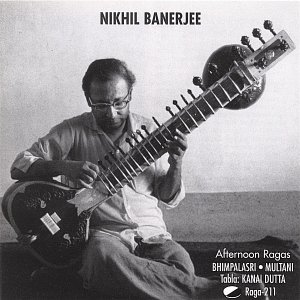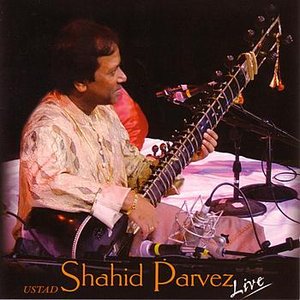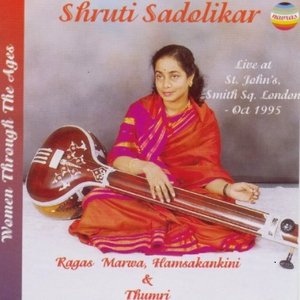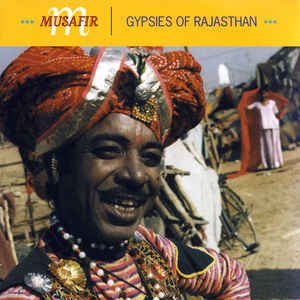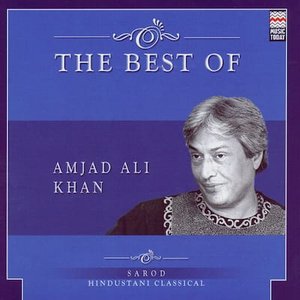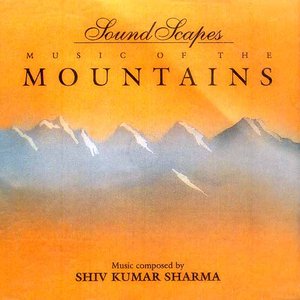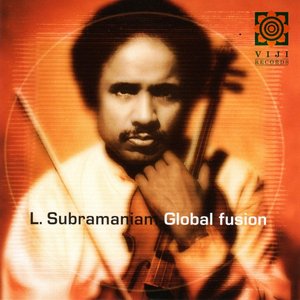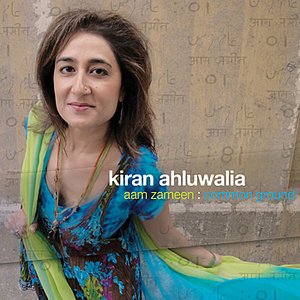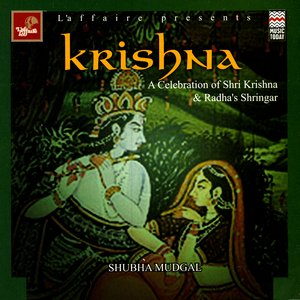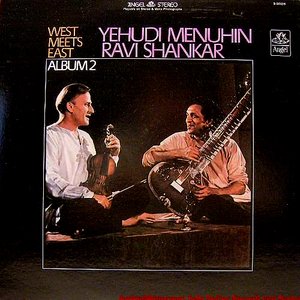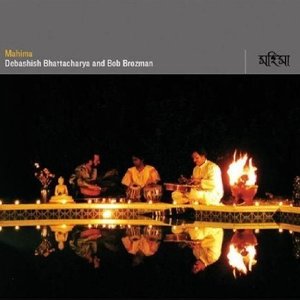Wiki
-
Release Date
1993
-
Length
4 tracks
A Meeting by the River is an album by Ry Cooder and Vishwa Mohan Bhatt, released in 1993 through the record label Water Lily Acoustics. In 1994, the album earned Cooder and Bhatt a Grammy Award for Best World Music Album.
.
American composer, musicologist and guitar legend Ry Cooder teams with North Indian musician Vishwa Mohan Bhatt to create an exquisite musical realm, with both musicians playing exceptional slide guitar. Their collaboration evokes musical elements from many cultures and styles. Percussion by Sukhvindar Singh on tabla and Cooder’s 14-year-old son Joachim on dumbek.Ry Cooder has long had an interest in other people’s music, from the blues and gospel of black America through classic jazz and the music of Cuba. Even by this standard, his meeting with Mohan Vishwa Bhatt is certainly a departure. He is neither a serious student of Indian music nor in any way a master of its intricacies. Yet on his improvised session (this album was recorded without rehearsal in one evening), he and Bhatt truly collided musically and created moments worthy of the world-music Grammy they received for it. Bhatt is an iconoclastic character himself. He plays a modified box he calls the Mohan vina that is a hybrid of a classical Indian instrument and slide guitar. He is long trained in the arduous classical style, yet his work has always demanded a lot of freedom. His duets here with Cooder are completely unique, liberating both artists from the usual constraints and creating a new musical style that is unlikely to be repeated or imitated. –Louis Gibson on amazon.comProfessional ratingsAllmusic 4.5/5 stars
Review by Daniel Gioffre of allmusic:
A Meeting by the River can best be described as a spontaneous outpouring of music, unhindered by convention or form, brought into being by musicians so supremely capable that the music is never labored, the technique of their craft always subservient to the final product. Cooder and Bhatt are genuine masters of the guitar and Mohan vina, respectively. The latter, an instrument created by Bhatt himself, is a sort of hybrid between a guitar and a vichitra vina, and is played with a metal slide. This fact is just one of the many things that connect Bhatt’s playing to Cooder’s, who plays nothing but bottleneck guitar here. The musical interplay between Cooder and Bhatt is nothing short of astounding, especially so considering that they met for the first time only a half-hour before the recording of this album. The voices of the two instruments blend marvelously, first alternating melodic statements, then doing so together, each dancing around the other, playing cat and mouse, probing, answering, reflecting. They are ably accompanied by a pair of percussionists: tabla player Sukhvinder Singh Namdhari and Cooder’s own son, Joachim, on dumbek. A Meeting by the River is one of those few cross-genre albums in which the listener never feels for a second that there is some kind of fusion going on; one does not hear the component parts so much as the integrated whole. However, one can theoretically separate guitar from vina, America from India, the Mississippi from the Ganges. Once this is done, the resulting music makes more sense than ever before, the combination of two traditions of stringed instruments that use slides to produce sound and value improvisation and voice-like phrasing. As good as this sounds on paper, the actual results are even more impressive. The splendor of the music is aided in its transmission by the fact that, like all Water Lily Acoustics releases, this album is masterfully recorded; each instrument is clear, distinct, and three-dimensional sounding. A Meeting by the River is a must-own, a thing of pure, unadulterated beauty, and the strongest record in Cooder’s extensive catalog.
Review by Michael Fremer of music angle:
Like West Meets East (Angel/EMI 36418 LP) the famous Ravi Shankar/Yehudi Menuhin collaboration from 1966, this 1992 get together between the guitarist/musicologist Ry Cooder and Vishwa Mohan Bhatt, a classically trained Indian musician you may have unknowingly seen playing the Mohan Viña (an instrument he devised) in the DVD “A Concert For George,” attempts to mesh Eastern and Western musical sensibilities.While the Shankar/Menuhin record paired two classically trained musicians playing Eastern and Western classical music, this one crosses rougher terrain, with the Eastern classicist comparing musical notes with the less formally trained, but eclectically informed Cooder.V.M. Bhatt’s Mohan Vinã (inspired by the North Indian instrument the Vichitra Vinã), is a big, hollow bodied “F” holed acoustic slide guitar variant featuring a dozen sympathetic drone strings tensioned on an “auxiliary” neck, located next to the three melody and five drone strings running the length of the main neck. It’s played lap-style, with strings both picked and slid upon using a heavy steel rod. The result is an instrument capable of both tugging at the heart seductively and soaring freely above a complex weave of continuous textures.
Cooder brings his slinky, bottleneck slide guitar to the proceedings and while it’s a less ephemeral, less complex instrument than the Mohan Vinã, its spare, angular, cooler presentation better delivers the western sensibilities at the core of Cooder’s musical consciousness that ranges from the Tex-Mex border to the Bahamas to Hawaii.
This collaboration came about after luthier Rick Turner heard an earlier Bhatt recordings and suggested to WaterLily founder and engineer Kavi Alexander that he get a copy to Cooder who was sufficiently impressed to arrange for a collaborative session that Alexander was invited to record using his minimalist analog recording techniques.
So, in September of 1992 after ten hours of film scoring in an L.A. studio, Cooder drove to Santa Barbara, CA where, in a motel lobby, he met Bhatt for the first time in. The two headed over to the Christ the King Chapel, where Alexander had set up his Tim De Paravini built 1” 15 IPS two track analog tape recorder and custom vacuum tube driven Blumlein microphone array. The slide guitar duo were joined by Tabla player Sukhvinder Singh Namdari and on Dumbek (another kind of drum), Cooder’s then fourteen year old son Joachim.
The results are four, approximately ten minute long improvisations that are among the most pure and sublime you are likely to encounter on record. The communication begins tentatively with Bhatt in the lead suggesting an Eastern motif and Cooder following with a cautionary strum. As Bhatt snakes his way East, Cooder finds an in and lays out some parched Paris, Texas-like accents that Bhatt picks up and runs with heading West. Cooder grabs it and heads East and the two are off as the tabla enters, driving the rhythmic thrust forward with the two slide guitarists trading complex, harmonically exquisite runs to the tune’s graceful conclusion.
Passionate, mysterious, intricate, earthy, ethereal, moody and mystical, the rich musical improvisations on this recording defy categorization. Though unplanned and totally improvised, the music’s orderliness and logical flow makes it seem somehow pre-ordained. Listen to the snaky, sinewy “Ganges Delta Blues” and you’ll be won over instantly.
The recording is as astonishing as the music: a harmonically complex, three dimensional, two-microphone purist production that will easily takes its place at the top of the sonic heap in your record collection and that’s a guarantee. Cooder stage right, Bhatt stage left, the percussion taking up the space in between, this is among the most spacious, convincing three-dimensional recordings you will ever hear.
When first issued in 1993 on CD, during vinyl’s darkest days, though there was talk of an LP edition, it never materialized. The CD sounds plenty good, mind you, but those of us still into vinyl could only imagine how a well-made LP version might sound.
Fifteen years later, thanks to Acoustic Sounds’ Chad Kassem, the wait is finally over. Not only do we finally have the vinyl edition, we have it as a double 45rpm 180g set!
CD playback has improved greatly since 1993 so before listening to the vinyl I refreshed my memory with the CD, which still sounds great. Great, yes, but not even close to the serenity and transparency of the vinyl. Now the scrim is lifted, air fills the space around the instruments and you are in the church. String transients and drum skin textures only hinted at on CD come to life. A late-night listen with the lights out must! An essential record in any 21st century vinyl collection.
Review of the CD release by Corey Greenberg of stereophile:
I probably shouldn’t be writing this review. I feel pretty passionately that a music reviewer should have a musical genre down if he’s going to tackle one of its records, so how can I possibly cover this one if the sum total of my experience with traditional Indian music is the Ravi Shankar side of The Concert for Bangla Desh?The answer is, because A Meeting by the River isn’t traditional Indian music. I’m not sure exactly what it is at all, except that it’s magic music of a rare and graceful curve that completely captivated me the first time I heard it; I’ve listened to it dozens of times since, at all hours of the day in all permutations of attentiveness, and I don’t feel as if I’ve even scratched its timeless and elliptical surface.Here’s the lowdown: Grateful Dead luthier and Alembic Guitars founder Rick Turner turned his pal Ry Cooder on to a Water Lily Acoustics record of Vishwa Mohan Bhatt, an Indian slide guitarist. Ry freaked, the gears turned, and soon he and Vishwa were sitting barefoot with their slide guitars on a giant Persian rug inside Christ the King Chapel in Santa Barbara, CA, while our hero Kavi Alexander threw up his tubed Blumlein pair and fed them spicy homemade curries and fresh Indian tea to grow the vibe.
The vibe. If one word sums up A Meeting by the River, it’s vibe. Records used to be filled with vibe of some kind or another, sounds that suggested feelings and emotions and whole universes of modal patterns that made listening to the record feel like stepping into a whole ‘nother zone. But I’ve become so accustomed to the modern musical aesthetic of 2-D shallow disposable nothingness that when a record like this one—which positively drips with vibe—crosses my path, I’m genuinely taken aback.
Like I said, this isn’t traditional Indian music. Without so much as a half-hour between their first introduction and the start of the session, Cooder’s Tex-Mex border slide and Bhatt’s shimmering Indian quaver meet on that laughing white sliver of moon that smiles peacefully at the segregation of musical categorization and gently blows it off into the cosmos where it can do the least harm. As the session progresses, Ry’s guitar lines start bending their heads toward India while Vishwa’s get bluesier; the two seemingly disparate guitars eventually embrace one another and intertwine until you can’t tell where one leaves off and the other begins. Backed by the rhythm section of Sukhvinder Singh Namdhari on tabla and Cooder’s 14-year-old son Joachim on the bongo-like dumbek, the two master slide guitarists converse in ancient broken melodies and weave a spell that begs for Sag Paneer, darkness, and infinite repeat.
Why does this A Meeting by the River juice my lizard so mightily? What sets this disc above virtually all similar recordings is that the entire session was totally improvised; the sounds on this record are two musicians meeting, delivering graceful introductions, complimenting and complementing each other while laying out vast landscapes of sound without a trace of inhibition or awkwardness. A Meeting by the River is the essence of that most powerful of music’s ingredients—communication—and while the music itself is often tranquil, the message will carry you away, heart pounding and monkeybone throbbing.
For a recording to make Stereophile’s “Recording of the Month,” it’s got to deliver the sonic goods as well as the musical mojo. I’m here to tell you that A Meeting by the River is just flat-out astounding, one of the most uncannily real recordings I’ve ever heard. I haven’t heard the LP yet, but the CD is a mind-blower: mastered directly from a CD-R transfer of the analog master, this is the best-sounding acoustic guitar recording I’ve ever heard. From the most subtle string-scrape die-offs to the unleashed dynamics throughout “Ganges Delta Blues,” the sound just breathes life into the room and makes the best-sounding discs in my rack sound grainy and flat by comparison.
A Meeting by the River is the first genuine Audiophile-Approved recording whose spirit matches its sonics; it takes me on a trip every time I listen to it, and recommendations just don’t come any higher than that from me. Think about it: Ry Cooder! Improvising slide guitar with an Indian master! On a 3-D Blumlein-miked triode-tubed analog recording!
Track listing
Side One
1. “A Meeting by the River” (V.M. Bhatt, Ry Cooder) – 10:03
Side Two
2. “Longing” (V.M. Bhatt, Ry Cooder) – 11:56
Side Three
3. “Ganges Delta Blues” (V.M. Bhatt, Ry Cooder) – 9:57
Side Four
4. “Isa Lei” (Lieut. A.W. Caten) – 7:39
Released: 1993
Recorded: September 1992 at Christ the King Chapel, St. Anthony’s Seminary, Santa Barbara, CA
Genre: World Music
Length: 39:35
Label: Water Lily Acoustics/Analogue Productions
Producer: Kavichandran Alexander
Personnel
* Ry Cooder – bottleneck guitar
* Vishwa Mohan Bhatt – Mohan vina
* Sukhvinder Singh Namdhari – tabla
* Joachim Cooder – dumbek
Album descriptions on Last.fm are editable by everyone. Feel free to contribute!
All user-contributed text on this page is available under the Creative Commons Attribution-ShareAlike License; additional terms may apply.

